As a BetterHelp affiliate, we receive compensation from BetterHelp if you purchase products or services through the links provided
When dealing with depression, it’s common to feel hungry but struggle to find appealing food. Maintaining a balanced diet and receiving essential nutrients for physical and mental well-being can make it difficult. The link between depression and diet is crucial, as certain nutritional deficiencies and food choices can exacerbate depressive symptoms. Conversely, a balanced diet with specific nutrient-rich foods can help manage depression and improve overall health.
If you’re struggling with a lack of appetite or finding your taste preferences have shifted during times of depression, it’s important to identify foods that can alleviate symptoms while being palatable for you. This involves addressing underlying nutritional deficiencies and incorporating healthy foods into your meals. Also, considering the role of exercise alongside a balanced diet can help manage depression and improve your appetite.
Key Takeaways
- The connection between depression and diet is important, as it can impact physical and mental health.
- Addressing nutritional deficiencies and incorporating depression-friendly foods can help alleviate symptoms and improve appetite.
- Exercise is crucial in managing depression and should be considered alongside a balanced diet.
 Understanding the Depression-Diet Link
Understanding the Depression-Diet Link
Depression can affect various aspects of your life, including your appetite. You might find it difficult to enjoy or choose the foods you want. Understanding the connection between your diet and mental well-being is important to make healthier choices that benefit your brain and body.
A well-balanced diet can be crucial to your mental health and brain function. Consuming nutrient-rich foods can help alleviate depression symptoms and improve your overall mental well-being. On the other hand, poor dietary choices might exacerbate your feelings of sadness or lethargy.
Here are some key points regarding the depression-diet link:
- Nutrient-dense foods can boost brain health by providing essential vitamins, minerals, and amino acids your brain needs to function properly.
- Eating regular meals and snacks throughout the day helps stabilize your blood sugar levels, preventing mood swings and irritability.
- Certain foods, such as those rich in omega-3 fatty acids, can directly influence your mood, associated with decreased depression rates, and tryptophan. This amino acid helps produce serotonin, the “feel-good” hormone.
- Limiting caffeine and sugar intake can help prevent energy crashes and mood fluctuations.
- Avoiding highly processed foods reduces the risk of inflammation, which might contribute to depressive symptoms.
To make things easier when nothing seems appealing, here are some tips to help guide your food choices:
- Focus on whole foods: Opt for fruits, vegetables, whole grains, lean proteins, and healthy fats as the foundation of your meals.
- Stay hydrated: Water plays a significant role in brain function, so drink enough water daily.
- Stock up on mood-boosting foods: Include foods rich in omega-3 fatty acids (such as salmon and walnuts), sources of tryptophan (like turkey and bananas), and those high in antioxidants (such as berries and dark chocolate).
- Plan ahead: Consider meal prepping or having a list of go-to recipes to eliminate the decision-making process when feeling down.
- Allow yourself some flexibility: It’s okay to have comfort foods occasionally, as long as it’s not your main source of nourishment.
Remember, nourishing your body with wholesome foods can significantly impact your mental health and improve your depression symptoms. So, when nothing seems appetizing, choose foods that will satisfy your hunger and boost your mood and overall well-being.
Impact of Nutritional Deficiencies
When you’re experiencing depression, it’s common for your appetite to change and nothing to sound good. This can lead to nutritional deficiencies that may negatively impact your mental health. It’s important to know the key nutrients your body needs during this time and find ways to incorporate them into your diet.
A well-rounded diet should include a variety of nutrients to support your overall well-being. Some essential nutrients for mental health include:
- Vitamins and minerals: These micronutrients are crucial for normal brain function. B vitamins such as folate are important in synthesizing neurotransmitters like serotonin. At the same time, minerals like magnesium, zinc, and selenium are involved in various biochemical processes that support mental health.
- Amino acids: These are the building blocks of proteins. Many contribute to producing neurotransmitters, which are essential for proper brain function. Ensuring a balanced intake of amino acids can help support mood and cognitive functions.
- Omega-3 and omega-6 fatty acids: These essential fatty acids help maintain the structure of your brain cells and their ability to communicate. A proper balance between the two fatty acids is essential for mental well-being.
- Fiber: A diet high in fiber can help support digestion and overall gut health. This is important, as a healthy gut microbiome plays a significant role in mental health and well-being.
If you’re struggling with a lack of appetite, try incorporating nutrient-rich foods like fruits, vegetables, whole grains, lean proteins, and healthy fats into your meals and snacks. You can also consider taking a multivitamin to help cover any gaps in your nutrient intake.
Here are some strategies to help you consume essential nutrients even when nothing sounds good:
- Drink your nutrients: Sip on smoothies made with nutrient-dense fruits, veggies, and protein sources like Greek yogurt or nut butter.
- Make meals visually appealing: Colorful and well-presented dishes can make them more appealing and increase your appetite.
- Prioritize high-nutrient foods: When choosing what to eat, select nutrient-dense foods like salmon, spinach, and quinoa to maximize the nutritional value of each bite.
- Don’t forget the snacks: Healthy snacks like nuts, trail mix, or yogurt can help you absorb essential nutrients throughout the day.
Remember, maintaining a balanced diet is important for mental health during these challenging times, even when nothing seems appealing. Prioritizing proper nutrition and consuming essential nutrients can help support your overall well-being as you navigate your depression journey.
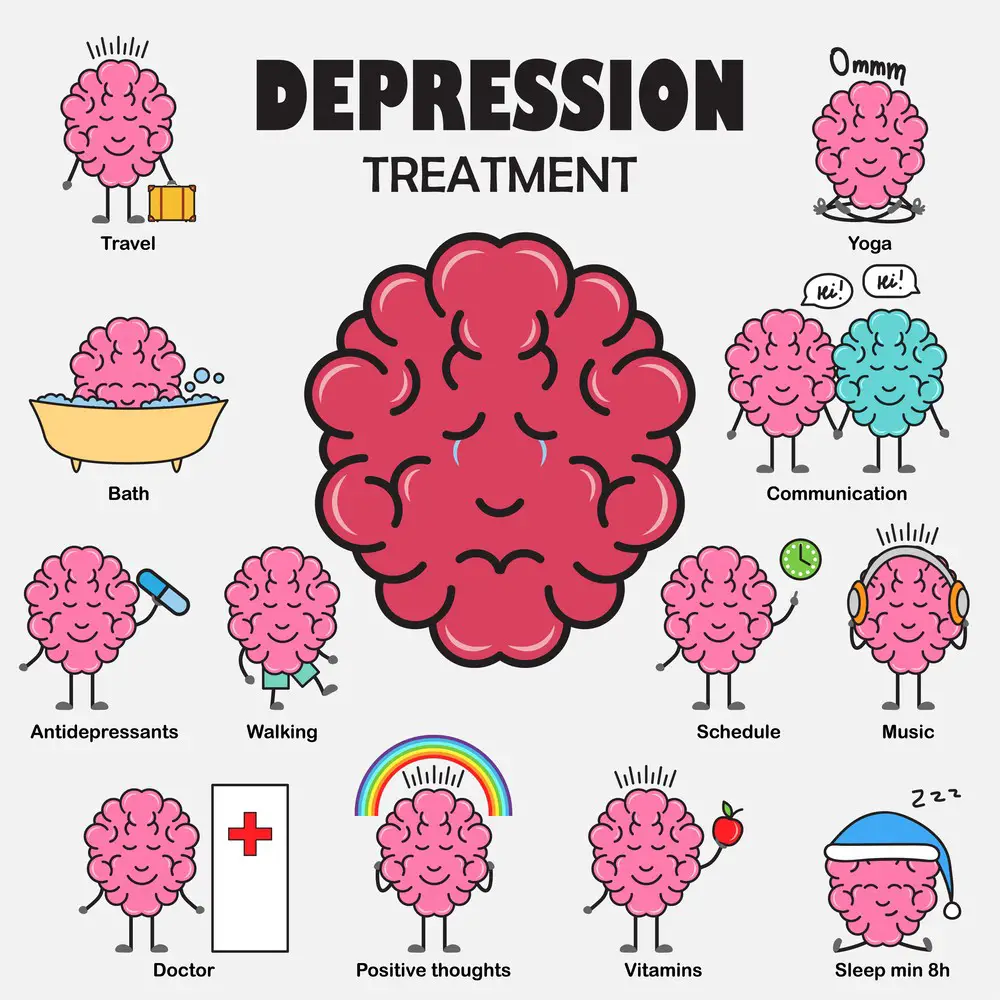
Role of Certain Foods in Managing Depression
When you’re experiencing depression, paying attention to your diet is essential. Consuming certain foods can help improve your mood and alleviate depression symptoms. To make your meals more appealing and beneficial, let’s explore some foods you can incorporate into your daily routine.
Tea can be a soothing beverage, especially when nothing else seems appealing. Opt for green or black tea, which contains antioxidants that may help combat depression.
Incorporating protein and carbohydrates in your meals is crucial for maintaining energy levels and promoting serotonin production. Foods like fish, eggs, lean meats, and poultry provide essential amino acids that work as building blocks for serotonin. Combine these with whole grains, such as brown rice or quinoa, to create well-rounded meals.
Fish, particularly salmon, is an excellent source of omega-3 fatty acids known to improve mood and brain function. Other good sources include nuts and seeds.
Fruits and vegetables should be a staple in your diet. They’re rich in vitamins, minerals, and antioxidants that support overall health. Focus on colorful, nutrient-dense options like leafy greens, berries, and bell peppers. Additionally, consider incorporating probiotics through yogurt or fermented foods like sauerkraut for gut health, which may also impact mood.
Snacking throughout the day can help maintain stable energy levels. Reach for snacks like:
- Nuts and seeds: Walnuts, almonds, and chia seeds.
- Veggies with hummus or salsa: Carrots, celery, and cucumber.
- Nut butter with whole grain toast: Almond or peanut butter.
- Fruits: Sliced apples, bananas, or berries.
Stay hydrated by drinking plenty of water throughout the day. Dehydration can lead to fatigue and irritability, worsening your depression symptoms.
Lastly, experiment with new recipes and cooking styles to make meals more appealing. Try different spices, dressings, or preparation methods to find your preference and enjoy your food while benefiting from the nutritious profile.
Remember that while no single food will magically cure depression, a well-balanced diet consisting of whole foods, lean proteins, and healthy fats can significantly manage your symptoms and improve overall well-being.
 Avoid These: Foods that Exacerbate Depression
Avoid These: Foods that Exacerbate Depression
When you’re struggling with depression, it’s essential to be mindful of the foods you consume, as some can make your symptoms worse. To help you make healthier choices, here is a list of foods to avoid:
- Fast food: These often contain high levels of saturated fat and, when consumed regularly, can increase your risk of depression by up to 40%. Opt for healthier meals with whole ingredients instead.
- Refined carbs: Foods like white bread, pasta, and pastries rapidly spike your blood sugar levels, leading to energy fluctuations. This can negatively impact your mood. Reach for whole grains, fruits, and vegetables for sustained energy levels.
- Sugary foods: Candy, soft drinks, and other sweets can cause temporary mood lifts, followed by crashes that may intensify depression symptoms. Limit your sugar intake and focus on nutrient-dense foods.
- Processed foods: High in additives, artificial ingredients, and unhealthy fats, processed foods can contribute to depressive symptoms. Choose whole, natural foods as much as possible.
- Red meat: While lean meat, such as poultry and fish, can be beneficial, excessive consumption of red meat – particularly when it’s high in saturated fat – may be linked to depression. Adopt a balanced approach to including meats in your diet.
- Caffeine: Too much coffee or caffeinated beverages can disrupt sleep patterns and increase feelings of anxiety. Aim to consume caffeine in moderation and avoid it close to bedtime.
- Alcohol: Drinking alcohol can have a temporary mood-enhancing effect, but it’s a depressant that can cause or worsen depressive symptoms. Limit alcohol intake for better mental health.
Focus on incorporating a balanced diet of whole foods, fruits, vegetables, lean meats, and healthy fats to minimize the impact of depression on your life. Maintaining a healthy diet can support your mental well-being and make it easier to cope with challenging emotions.
 The Matter of Taste Preference in Depression
The Matter of Taste Preference in Depression
During depression, it’s common for your taste preferences to change, making it difficult to enjoy or even feel like eating. This can affect your overall health and well-being if your body lacks the nutrients and energy.
One reason for this shift in taste preference could be a result of changes in brain activity. Depression can alter the way your neurotransmitters function, which in turn affects your sense of taste. You might find that foods you once enjoyed now seem bland or unappealing.
To help combat this issue, try some of the following strategies:
- Experiment with new flavors and textures: Introduce yourself to different types of food you haven’t tried before or haven’t had in a while. This can help you discover new tastes that may appeal to you during this time.
- Spice it up: Try adding herbs, spices, or condiments to your meals. This can add extra flavor and make your food more enjoyable.
- Focus on nutrient-dense foods: Choose foods rich in vitamins, minerals, and antioxidants – such as fruits, vegetables, whole grains, and lean proteins – to help improve your overall health and well-being. These foods can also provide a more satisfying taste experience.
- Make a list of go-to recipes: Keep a list of easy, healthy meals you can prepare when feeling down. Having a plan can help you feel more in control and less overwhelmed by meal planning.
Key Takeaway: Depression can alter your taste preferences, making it difficult to enjoy food. Explore new flavors, add spices, choose nutrient-dense foods, and have a list of go-to recipes to help improve your taste experience during these challenging times.

How to Address Lack of Appetite
Losing your appetite can be a common symptom of depression, making it difficult to find motivation and enjoyment in food. Here are some strategies to help address this issue while maintaining proper nutrition.
1. Create a meal plan: Planning your meals can alleviate some of the stress of deciding what to eat. Focus on including foods rich in nutrients, like fruits, vegetables, lean proteins, and whole grains.
2. Eat smaller, regular meals: Instead of three large meals, eat smaller meals more frequently throughout the day. This can help encourage appetite even when nothing sounds particularly appealing.
3. Opt for easy meals: Hot, nutritious meals can be made easily with minimal preparation. Consider options like soup, smoothies, or pre-packaged healthy frozen meals when you don’t feel like cooking elaborate dishes.
4. Listen to your cravings: If you crave a specific food, give in to it occasionally. It’s okay to indulge occasionally, as long as you maintain overall balance in your diet.
Remember, giving your body the fuel it needs is essential, even when you lack appetite. Be patient and gentle with yourself, and consider seeking help from a professional if your lack of appetite persists or worsens.
 The Role of Exercise Alongside a Balanced Diet
The Role of Exercise Alongside a Balanced Diet
It’s no secret that maintaining a well-balanced diet is crucial when combating depression. However, did you know that incorporating exercise into your routine can make a significant difference? Let’s dive into the role exercise plays alongside a nutritious diet.
When you’re feeling low, finding motivation to exercise might seem impossible. But even gentle physical activity can produce mood-boosting endorphins and help improve your mental well-being. Try walking outside or engaging in a low-intensity workout, like yoga or stretching. These activities can encourage relaxation and stress reduction.
Incorporating exercise into your daily routine can also help improve your sleep quality. Adequate sleep is essential for mental health and can make it easier to manage depressive symptoms. By supporting a healthy sleep schedule, regular exercise complements the positive effects of a balanced diet on your overall well-being.
Combining exercise with nutritious snacks before and after workouts can maximize the benefits on your mood. You might consider consuming:
- Carbs such as whole grain toast, oatmeal, or a banana to fuel your workout
- Protein sources like yogurt, nuts, or a protein shake to aid recovery and muscle repair
Remember, balance is key. Overdoing exercise or pushing yourself too hard can have negative effects, like consuming an imbalanced diet. So, listen to your body and find the right combination of physical activity and healthy food that works best for you.
It’s important to stay patient, as improvements in your mood may not be noticeable immediately. Remember that consistently incorporating exercise and a well-balanced diet can make a big, positive difference in your battle against depression. And always reach out to a healthcare professional for guidance and support when needed.
Key Takeaway: Exercise alongside a balanced diet can enhance mood, improve sleep quality, and support overall mental well-being. Incorporate gentle physical activities and combine them with nutritious snacks to maximize the benefits on your mental health.
 Seeking Professional Guidance
Seeking Professional Guidance
If you’re struggling with depression and finding it difficult to choose what to eat, it’s essential to seek professional guidance as a starting point. A dietitian or therapist can help you navigate this challenging time and provide valuable advice on maintaining a healthy diet and lifestyle despite a lack of appetite.
Dietitians can guide you in selecting nutritious options that boost your mood and provide essential nutrients, even when nothing sounds appealing. They can create personalized meal plans with easy-to-prepare foods, considering your specific needs and preferences. Additionally, they can offer helpful tips on incorporating nutrient-dense, mood-boosting snacks into your daily routine.
Sometimes, medications like antidepressants may impact your appetite, affecting your nutritional intake. In such cases, working closely with your healthcare provider can be crucial. They can assess the potential side effects of your medications and adjust the doses or prescribe alternative medications if necessary.
Moreover, discussing your symptoms with a mental health professional can provide you with coping strategies to manage the emotional aspects of depression. They may suggest therapy options, such as cognitive-behavioral or interpersonal therapy, which can assist you in identifying and addressing underlying triggers for your depressive episode and loss of appetite.
By seeking guidance from a team of professionals, you can navigate the complex relationship between depression, appetite, and nutrition. They can provide a comprehensive approach to addressing your mental and physical well-being and help you work towards recovery. Remember, taking the first step by reaching out for help is crucial for overcoming these challenges and restoring your love for food.
 Creating Your Depression-Friendly Shopping List
Creating Your Depression-Friendly Shopping List
When experiencing a depressive episode, it can be tough to even think about grocery shopping, let alone plan and cook meals. The key here is to keep your shopping list simple and stick to foods known to help boost mood and energy levels. Here’s a collection of items that will help you create a depression-friendly meal plan:
Stock up on complex carbohydrates:
These foods provide a steady release of glucose, fueling your brain and maintaining your energy levels throughout the day. Examples include:
- Whole grains like brown rice, quinoa, and oats
- Whole wheat or whole grain bread
- Whole wheat pasta
- Sweet potatoes and other starchy vegetables
Stay hydrated:
Dehydration can worsen your depression symptoms, so fill up your cart with fluids like water, herbal teas, and natural fruit juices (avoid added sugars).
Fight inflammation and oxidation:
Inflammation and oxidative stress play a role in depression, so load up on antioxidant-rich and anti-inflammatory foods such as:
- Leafy greens, like spinach and kale
- Colorful fruits, such as blueberries, cherries, and oranges
- Nuts and seeds, like almonds, walnuts, and chia seeds
- Fatty fish, like salmon and sardines, rich in omega-3 fatty acids
Keep it simple with easy meal components:
A few versatile ingredients will make it easier to whip up a balanced meal, even when you’re feeling low. Consider adding items like:
- A can of beans for added protein and fiber. Mix with salsa and serve over brown rice for a quick meal.
- Eggs (hard-boiled or scrambled) with veggies and whole-grain toast
- Low-sugar yogurt with fruit and a sprinkle of nuts or seeds
As you build your depression-friendly shopping list, remember that it’s all about setting yourself up for success. By choosing foods that help maintain energy levels, boost mood, and fight inflammation, you’ll be better prepared to navigate tough days.
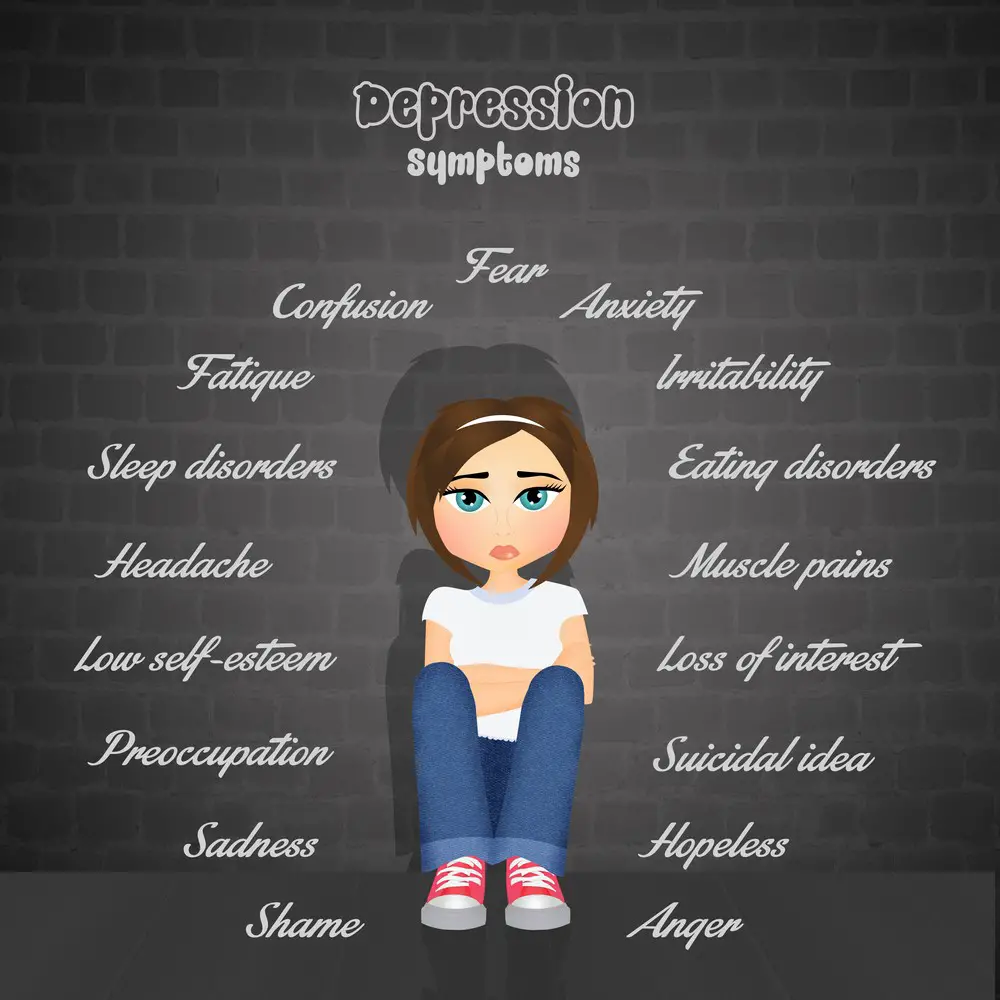
Conclusion
When depression strikes, it’s difficult to find the motivation to eat, let alone choose tasty and nutritious meals. However, it would be best to prioritize your nutritional needs for your mental well-being.
Consider incorporating smoothies, soups, and high-protein snacks into your diet. These options are easy to prepare and provide essential nutrients that support your mood and energy levels. Additionally, try including nutrient-dense foods such as dark leafy greens, legumes, and whole grains in your meals.
It’s important to avoid certain food items that might exacerbate your depressive symptoms. Limit your consumption of caffeinated drinks, sugary foods, alcoholic beverages, and processed deep-fried foods. Instead, choose healthier choices like herbal teas and drinks, whole foods, and lean proteins.
By consciously eating well and nourishing your body during difficult times, you’re taking a positive step towards improving your overall mental well-being. Remember, it’s okay to take small steps – progress is still progress, no matter how small.
Frequently Asked Questions
 What are some easy-to-make meals for when I’m feeling down?
What are some easy-to-make meals for when I’m feeling down?
- Smoothies: Combine fruits, vegetables, nuts, seeds, and yogurt for a healthy, easy-to-prepare meal.
- Oatmeal: Cook up a warm bowl of oatmeal and top it with your favorite fruits, nuts, and a drizzle of honey.
- Veggie stir-fry: Sauté a variety of vegetables and serve with rice or noodles for a quick, nourishing meal.
- Sandwiches: Assemble a sandwich with whole-grain bread, lean proteins, and plenty of veggies.
- Baked potatoes: Top a baked potato with your favorite toppings like beans, cheese, and steamed vegetables.
Key takeaway: Keep it simple and focus on nutritious, easy-to-prepare meals.
How can I increase my appetite when I’m depressed?
- Eat smaller, more frequent meals throughout the day.
- Exercise regularly to stimulate your appetite.
- Stay hydrated, as dehydration can suppress your appetite.
- Add flavor to your meals with herbs and spices.
- Remove distractions while eating, such as electronics.
Key takeaway: Establish a routine and add appealing flavors to your meals to increase your appetite.
What are some comfort foods that may help during depression?
- Whole-grain pasta with a light tomato sauce.
- Warm vegetable soups with added beans or legumes for protein.
- Baked or mashed sweet potatoes with a sprinkle of cinnamon.
- Homemade pizza with whole-grain crust and veggie toppings.
- A warm bowl of chili made with lean protein and plenty of vegetables.
Key takeaway: Choose comfort foods packed with nutrients to help improve your mood and energy levels.
Are there any specific foods that can boost my mood?
- Omega-3-rich foods like fatty fish, walnuts, and chia seeds.
- Foods with B vitamins include leafy greens, whole grains, and lean proteins.
- Foods high in vitamin D, including fish, fortified dairy products, and egg yolks.
- Magnesium-containing foods like dark chocolate, avocados, and almonds.
- Serotonin-boosting foods, such as bananas, oatmeal, and turkey.
Key takeaway: Incorporate mood-boosting foods into your diet to support your mental well-being.
How do I choose a meal when I’m not in the mood?
- Opt for colorful, visually appealing foods.
- Create variety in texture and taste.
- Consider what you haven’t eaten recently to avoid food jags.
- Choose simple recipes or meal ideas.
- Consider meals that sound interesting, even if you’re not especially hungry.
Key takeaway: Focus on variety and keep meal choices simple to make decisions easier when you’re not in the mood for anything.
What are some tips for meal planning when dealing with depression?
- Plan your meals to reduce stress and decision-making.
- Keep a grocery list of your favorite foods and ingredients.
- Batch cook when you have energy and store leftovers for future meals.
- Share the meal planning and preparation responsibilities with a friend or family member.
- Keep a mix of healthy, easy-to-prepare options on hand for low-energy days.
Key takeaway: Planning and support can make mealtime more manageable when dealing with depression.
About Jacob Maslow
After surviving the traumatizing events of 9/11, I took it upon myself to heal through helping others. I’m the primary caregiver of my children and understand from first-hand experience the lonely paths you have to walk as a partner and parent when leaving an unhealthy relationship.
We’re all echoing in a dark space that doesn’t have to be this empty, and that’s been my mission since finding solace and recovery in therapy: To help comfort others who are still in shock and at the prime of their struggle.
I came across BetterHelp after searching for this type of community. I wanted to belong to a body of proactive therapists and supportive therapy veterans that allowed me to see other sides of the story.
It was unconventional, and that’s what attracted me most. During my most challenging times, when my ex-wife completely cut me off from my children, I found comfort and clarity through BetterHelp.
Instead of being chained to a strict therapist recommendation, I was in charge of who I felt understood my struggle most. That allowed me to find my true peace, as I was reunited with those who read behind my words and had first-hand experience with my trauma.
Recovery is a choice; with BetterHelp, that choice will be a few clicks away. You can join their couples-oriented platform, Regain.us for those stuck with family estrangement and toxic relationship patterns.
- 3 Ways Wearing a Hat Can Help Lower Your Stress Levels - April 19, 2025
- Breaking the Silence: Why Men’s Mental Health Matters More Than Ever - April 15, 2025
- How to Transform a Home’s Patio Space into a Relaxing Space - March 23, 2025
This site contains affiliate links to products. We will receive a commission for purchases made through these links.


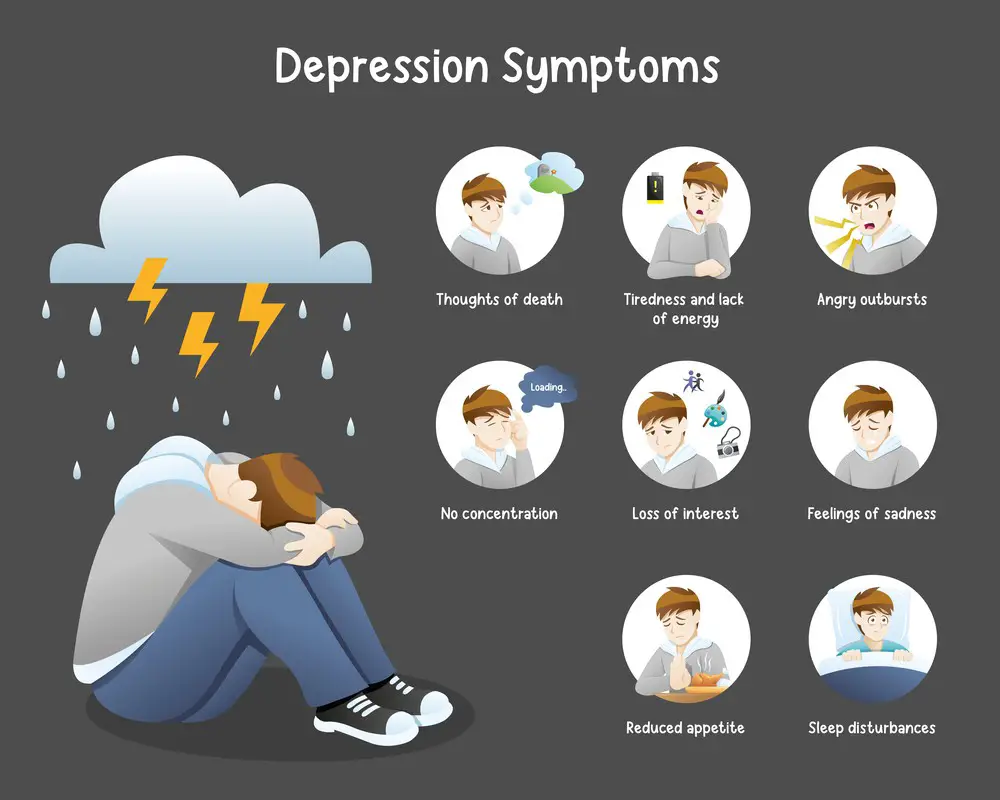 Understanding the Depression-Diet Link
Understanding the Depression-Diet Link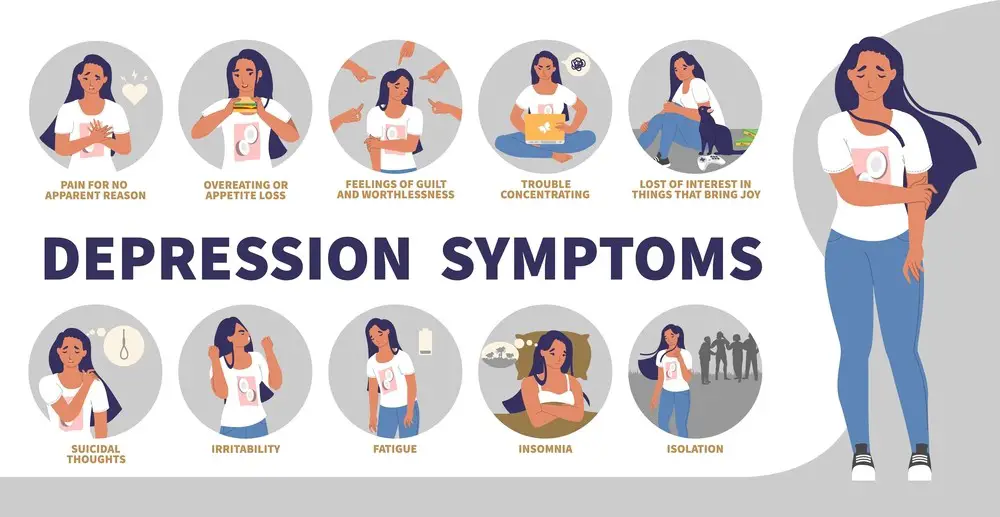 Avoid These: Foods that Exacerbate Depression
Avoid These: Foods that Exacerbate Depression The Matter of Taste Preference in Depression
The Matter of Taste Preference in Depression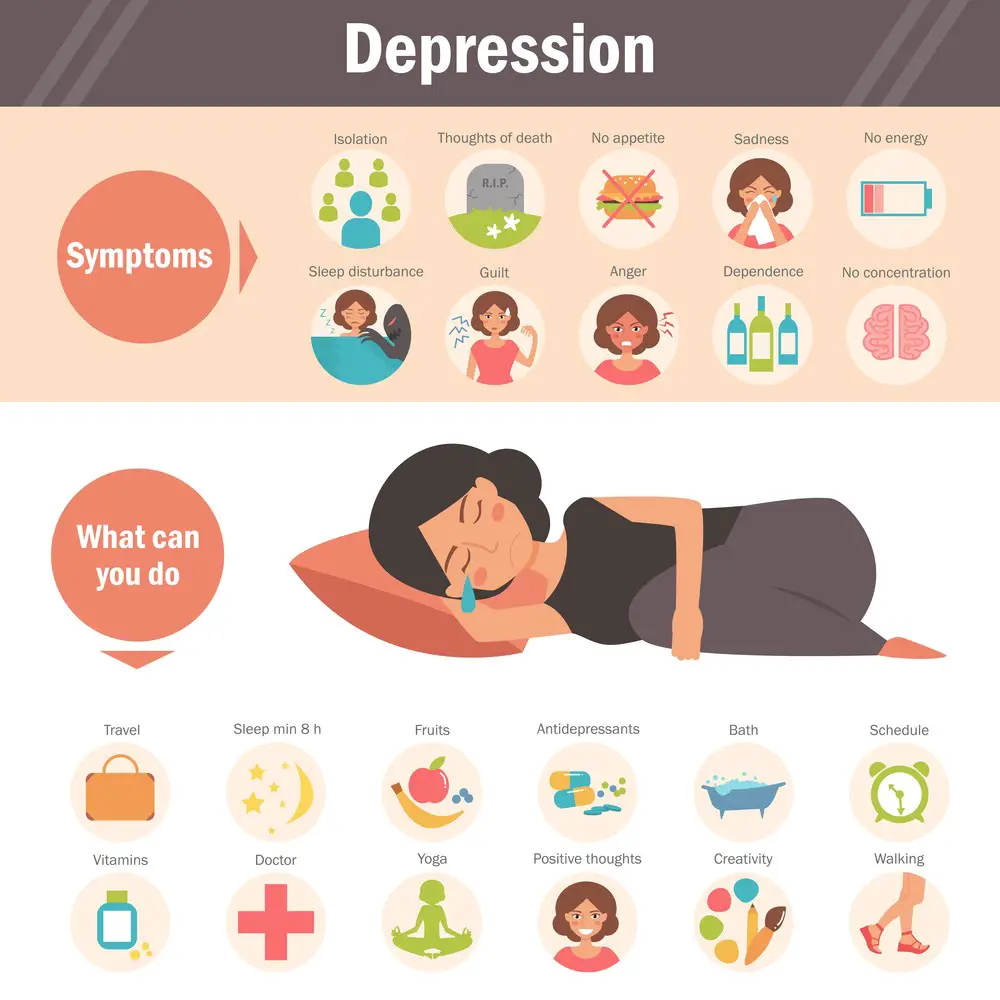 The Role of Exercise Alongside a Balanced Diet
The Role of Exercise Alongside a Balanced Diet Seeking Professional Guidance
Seeking Professional Guidance Creating Your Depression-Friendly Shopping List
Creating Your Depression-Friendly Shopping List What are some easy-to-make meals for when I’m feeling down?
What are some easy-to-make meals for when I’m feeling down?
